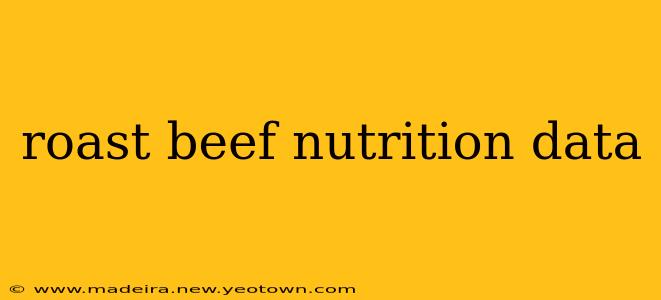Roast beef, a culinary classic, isn't just a delicious centerpiece for a Sunday dinner; it's also a nutritional powerhouse. This succulent cut of meat offers a compelling blend of protein, vitamins, and minerals, making it a valuable addition to a balanced diet. But let's dive deeper into the specifics and explore the nutritional data behind this beloved dish.
What are the nutritional benefits of roast beef?
Roast beef is primarily known for its high protein content. Protein is essential for building and repairing tissues, making it crucial for muscle growth and overall bodily function. A 3-ounce serving of lean roast beef can provide around 25-30 grams of protein, significantly contributing to your daily protein intake. Beyond protein, roast beef is a good source of iron, crucial for red blood cell production and preventing anemia. It also contains B vitamins, particularly B12, which plays a vital role in nerve function and red blood cell formation. Furthermore, roast beef offers smaller amounts of zinc, selenium, and niacin, all contributing to overall health.
How many calories are in roast beef?
The calorie count in roast beef varies significantly depending on the cut of beef, the preparation method (e.g., lean vs. fatty, presence of added fat during cooking), and the serving size. A 3-ounce serving of lean roast beef typically contains between 150-200 calories. However, fattier cuts or preparations can significantly increase this number. Being mindful of your portion size and choosing lean cuts is crucial for managing your calorie intake.
Is roast beef high in fat?
The fat content in roast beef depends heavily on the cut. Leaner cuts like sirloin or tenderloin boast lower fat content, while more marbled cuts like ribeye are naturally higher in fat. The cooking method also influences fat content. Roasting, especially when excess fat is trimmed before and after cooking, can help minimize fat intake compared to frying or pan-searing. Remember that healthy fats are essential, but moderation is key.
How much protein is in roast beef?
As mentioned earlier, roast beef is an excellent source of protein. A 3-ounce serving of lean roast beef usually provides around 25-30 grams of protein. This high protein content makes it an ideal choice for athletes, individuals looking to build muscle, or anyone needing to support tissue repair and overall bodily function. The type of protein in beef is also high-quality, meaning it contains all nine essential amino acids your body needs.
What are the potential downsides of eating roast beef?
While roast beef offers numerous nutritional benefits, it’s important to acknowledge some potential downsides. Red meat consumption has been linked to an increased risk of certain cancers and heart disease, particularly in individuals who consume large quantities. Choosing lean cuts, limiting portion sizes, and ensuring a balanced diet can help mitigate these risks. Furthermore, those with gout may need to moderate their intake due to the purine content in red meat. It's always wise to consult a healthcare professional or registered dietitian if you have specific concerns about red meat consumption.
Conclusion: Enjoy Roast Beef Responsibly
Roast beef, when consumed as part of a balanced and varied diet, can be a delicious and nutritious addition to your meals. Its high protein content, essential vitamins, and minerals make it a worthwhile choice. However, mindful consumption, considering lean cuts, portion control, and awareness of potential health implications, are crucial for maximizing the benefits and minimizing potential risks. Enjoy the flavor, but remember to practice moderation!

